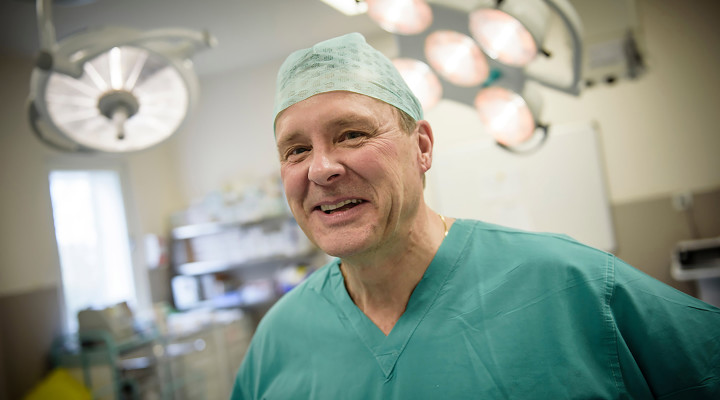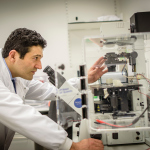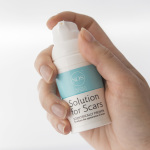THE pioneering Cheshire plastic surgeon behind a vegan skin cream which uses the healing power of green tea to reduce scarring, has been named the best plastic surgeon in the UK for scar management.
Douglas McGeorge MBE is Medical Director of expanding North West skincare company Science Of Skin. Now he has been named Best Scar Management Plastic Surgeon of the Year in the Global 100 awards for 2019.
Renowned for his dedication to making sure patients are left with as little scarring as possible, Mr McGeorge last year won an MBE for his services to charity.
His company’s flagship product Solution for Scars was recently proven in a clinical trial to work at a cellular level to reduce the thickness of scars by 20% and redness by 40%, within four to six weeks.
A Senior Consultant Plastic Surgeon at Nuffield Health’s Grosvenor Hospital in Chester and at SPIRE Healthcare in Warrington, Mr McGeorge has helped train many of the new plastic surgeons in the North West over the last 20 years.
He is also honorary consultant at the Countess of Chester hospital where he launched a new plastic surgery unit and lead the service for a decade. Amongst the causes he supports, he was a Trustee of the Scar Free Foundation for many years.
Mr McGeorge co-founded Science Of Skin with University of Manchester skin biologist Ardeshir Bayat five years ago, on a mission to reduce scarring.
Their products include Solution for Scars, Solution for Stretch Marks, Solution for Bites, and a newly launched Rescue No.One cream that targets acne scarring,
“I am delighted with this recognition from the Global 100 list,” said Mr McGeorge, a former president of the British Association of Aesthetic Plastic Surgeons (BAAPS).
“Improving scar management has been a mission of mine since I started in plastic surgery over 30 years ago, and this award is testament to the expertise behind the pioneering work we are doing with Science Of Skin.
“As a cosmetic surgeon, I have always said that, for a patient, the difference between a good result and a poor result is the quality of the scar left behind after surgery; something out of the control of even the most skilled and gifted surgeon.
“Now we have developed a cream that can improve results, reducing scarring and leaving people with a far better result psychologically and emotionally, as well as visually.”
The Global 100 program provides a benchmark of the best industry leaders, exemplary teams and distinguished organisations around the world. It was set up by international publisher DSN [Direct Selling News], and votes are received from readers in over 163 countries worldwide.
The award comes as sales are expanding for Science which now supplies scar-reducing creams around the globe including a deal with Boots in Ireland.
Science of Skin was this summer named among the Insider Media’s top 30 most exciting companies in the North West.
It comes after clinical trial carried out by scientists at the University of Manchester, revealed the unique plant-based formula in the Solution for Scars cream works by dramatically reducing the number of ‘mast cells’, which cause inflammation and scarring.
The breakthrough study published in the internationally respected Journal of Investigative Dermatology. It revealed the cream, developed with natural plant-based ingredients by Science Of Skin, works at a cellular level to dramatically improve scarring after trauma.
The scientists found not only does the cream improve scarring – reducing the thickness of scars by 20% and redness by 40% within four to six weeks, but more significantly, it starts working immediately when applied to the skin around a fresh wound, before a scar has even begun to form.
According to Science Of Skin’s Scientific Director and co-founder Dr Ardeshir Bayat, who led the research at the University of Manchester, it is the first time the concept of ‘zonal priming’ has been tested on humans.
Zonal priming means prepping the skin by applying the cream to the area around a fresh wound immediately, before a scar has even begun to form.
Science of Skin say the implications are revolutionary as it means an active solution can be applied topically around a wound to start working to reduce scarring at a cellular level, immediately after surgery or injury – ultimately leading to smaller scars for patients.
Mr McGeorge said: “The work we are doing demonstrates how the results can be improved with prior planning to manage the scar outcome. The topical treatments we have developed at Science of Skin can go a long way to achieving better outcomes.”
Among those who have benefitted from Science of Skin’s work is Kate Riley, a Police Constable with the Metropolitan Police left scarred by a freak accident when she fell into a garden fire causing third degree burns on her arm.
The 32-year-old credits Solution for Scars cream with helping her to improve the outcome of her accident and overcome the physical and psychological scars left by the trauma of the injury. It enabled her to start training for marathons again.
She said of the cream: “It has changed my life. I know people say things like that all the time, but this has really made such a difference, this tiny little bottle has done wonders for my arm. It has reduced the redness and the scar is healing so much smoother and softer: like normal skin.”
She added: “As the scar has improved and I’ve become more comfortable with how it looks, and I decided to start training again. It has helped with my physical and psychological confidence.”
Another patient who saw dramatic results from the solution for scars cream was former teacher Lindsay Taylor, from Milton Keynes. She used the cream to help minimize a disfiguring three-inch scar left by surgery to remove skin cancer from her face.
The results gave her the confidence to attend her daughter’s wedding, and celebrate her own 60th birthday, without feeling the need to cover her face she said: “From thinking I was going to look really awful instead I was full of confidence and I felt great.”
On-line sales are also growing for Science Of Skin, as the company is wholesaling to Amazon as well as selling direct to customers via its own website, and selected on-line beauty retailers.
The company is headed up by CEO Emma Blackman, who runs Science of Skin from Croston in Lancashire. All the creams are manufactured in the North West at the specialist beauty manufacturer Surefil, in St Helens.
Science of Skin Scientific Director Dr Bayat gave up his career as a plastic surgeon to pursue his mission to improve wound healing and is now an internationally respected skin biologist at the University of Manchester.
Mr Bayat and Mr McGeorge met while working together as plastic surgeons and discovered a mutual passion for scientific investigation, to improve wound healing. The company was established after four years of research, which identified compounds that modify wound healing and significantly improve scarring.
For more information about Solution for Scars and Science of Skin visit www.scienceofskin.com

















